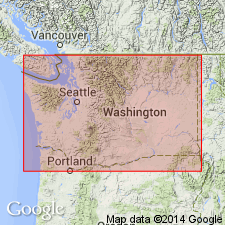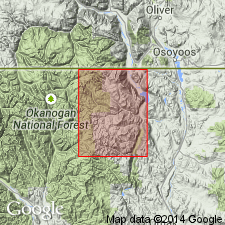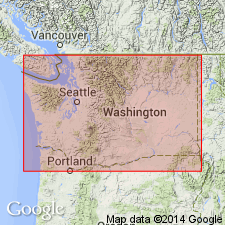
- Usage in publication:
-
- Cathedral granite
- Modifications:
-
- Named
- Dominant lithology:
-
- Granite
- AAPG geologic province:
-
- Cascades province
- Okanogan province
Summary:
Shown on geologic sketch map of batholithic areas west of Similkameen River along international boundary. Is a coarse-grained, light, pinkish-gray biotite granite of common macroscopic habit. Includes an informal "Younger phase" which intrudes older coarse granite. Cathedral granite intrudes Remmel granodiorite, Similkameen granite (new), remnant Paleozoic schists, and possibly through Cretaceous strata. Age is Tertiary.
[Type locality not stated. Named from Cathedral River.]
Source: Modified from GNU records (USGS DDS-6; Menlo GNULEX).

- Usage in publication:
-
- Cathedral Leuco Quartz Monzonite
- Modifications:
-
- Revised
- Redescribed
- Geochronologic dating
- Dominant lithology:
-
- Quartz monzonite
- AAPG geologic province:
-
- Cascades province
- Okanogan province
Summary:
Cathedral Leuco Quartz Monzonite in /Horseshoe Basin magma series [informal] (new). Previously called Cathedral Granite by Daly (1906). Mapped in Toats Coulee Creek region, Okanogan Range, Washington. Is a light-pink, coarse-grained, homogeneous, leuco quartz monzonite. Age is Early to medial Cretaceous, based on radiometric (K-Ar, biotite) age of 94.0 +/-2.8 Ma (citing Hawkins, 1968).
["Horseshoe Basin magma series" considered informal. Term "Series" is applied formally only to chronostratigraphic units (ACSN, 1961, 1970; NACSN, 1983, 2005, 2021).]
Source: Modified from GNU records (USGS DDS-6; Menlo GNULEX).

- Usage in publication:
-
- Cathedral pluton (quartz monzonite)
- Modifications:
-
- Geochronologic dating
- AAPG geologic province:
-
- Cascades province
- Okanogan province
Nichols, S.L., 1977, Age dates from other publications; List no. 1: Isochron/West, no. 20, p. 1-10.
Summary:
Cathedral pluton (quartz monzonite). Sample from Lat. 48 deg. 52.3 min. N., Long. 120 deg. 01.1 min. W., yielded K-Ar age of 97.7 +/-2.9 Ma (biotite). Data from Berry and others (1976).
Source: Modified from GNU records (USGS DDS-6; Menlo GNULEX).
For more information, please contact Nancy Stamm, Geologic Names Committee Secretary.
Asterisk (*) indicates published by U.S. Geological Survey authors.
"No current usage" (†) implies that a name has been abandoned or has fallen into disuse. Former usage and, if known, replacement name given in parentheses ( ).
Slash (/) indicates name conflicts with nomenclatural guidelines (CSN, 1933; ACSN, 1961, 1970; NACSN, 1983, 2005, 2021). May be explained within brackets ([ ]).

